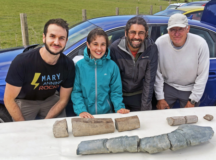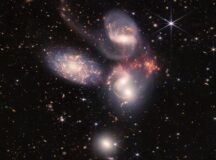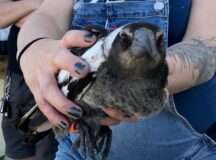The fossil Ruby Reynolds found when she was 11 has led to the discovery of a new prehistoric ocean reptile species.
Tag: science
James Webb Space Telescope gives us a better look at the universe
We can now see more of the universe, thanks to the most powerful telescope ever created.
Magpies Outsmart Researchers
Some magpies in Australia have taught researchers some lessons.
Are Too Many Satellites Ruining Our View Of Space?
Some astronomers say the growing number of satellites orbiting the Earth is making it harder for them to observe and learn from the universe.
Canadian Astronaut To Board ISS
The International Space Station is a spacecraft that orbits the Earth; it is part laboratory and part home for astronauts. And soon it will have a new resident.
Canadian astronaut David Saint-Jacques will make the journey to the ISS on December 3. The launch is set for 6:30 a.m. He will remain on the spacecraft for about six months.
It is his first mission as an astronaut. It is the 17th space flight for the Canadian Astronaut Corps, according to the Canadian Space Agency.
While he is on board the ISS, Saint-Jacques will conduct experiments and demonstrate technology.
Canadian Scientist Shares Nobel Prize For Physics
The Nobel Prize is one of the biggest prizes in the world.
Dr. Strickland will share the prize with Dr. Gérard Mourou of France and Dr. Arthur Ashkin of the United States.
All three scientists won for their work creating tiny (miniature) tools using lasers.
The prize is $1.28 million. It will be divided among the three scientists. Half the money will go to Dr. Ashkin. Dr. Strickland and Dr. Mourou will share the other half.
Eating Healthy Can Lead To Better Grades: Studies
Four scientific studies, released last year, may help children make better choices about the food they eat. In one study, researchers from Ohio State University found that the amount of fast food children eat – things like burgers, fries and soft drinks – can affect how well they do in school. The researchers compared eating habits and test scores for more than 11,000 students across the United States. Grade five students were asked how often they ate fast food, and then they were tested on reading, math and science. The students were tested again in grade eight. The researchers found that students who had reported eating fast food four to seven times a week when they were in grade five performed worse on the grade eight tests than students who rarely ate fast food.
Stunning New Colour-Enhanced Pictures of Jupiter
NASA recently released new pictures of Jupiter, the largest planet in our solar system. The photos were taken by the Juno spacecraft. Many of the black-and-white images, sent back to Earth by Juno, have been colourized by people to better show the clouds swirling around the planet. The Juno spacecraft was launched in 2011. Its mission was “to examine Jupiter’s chemistry, atmosphere, interior structure and magnetosophere,” according to a NASA website. Juno arrived at Jupiter in 2016, looking for “clues to its origin and evolution.” Since that time, it has been orbiting (flying around) Jupiter, taking pictures and sending them digitally back to Earth.
Scientist Stephen Hawking Dead At Age 76
When we think of scientific geniuses, we may think of Albert Einstein, Marie Curie or Ada Lovelace. Stephen Hawking was right up there with the most brilliant minds of any generation. He passed away last week, at the age of 76.
It would take a book — or a movie (there are both) — to even scratch the surface of his accomplishments, his tremendous sense of humour, his influence on millions of people and the vast depths of his knowledge.
He helped the world better understand black holes and string theory. Black holes are extremely dense regions in space. We can’t see them. In fact, we can understand what they are only by how they affect things around them. Hawking furthered our understanding of them and many other areas of physics. His groundbreaking work changed science forever.
Cassini: Mission Accomplished
The Cassini space probe’s 20-year mission to Saturn is over. On September 15, at 4:55 a.m. Eastern Time on Earth, the spacecraft entered the atmosphere around Saturn. Moments later, it was destroyed. Cassini was launched in 1997. It had been […]










